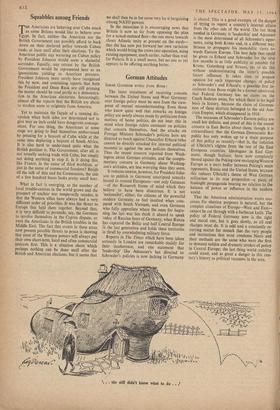Squabbles among Friends
THE Americans are behaving over Cuba much as some Britons would like to behave over Egypt. In fact, neither the American nor the British Government can possibly afford to back down on their declared policy towards Cuban trade, at least until after their elections. To the American public any wavering on Cuban policy by President Johnson would seem a shameful surrender. Equally, any retreat by the British Government would be represented here as an ignominious yielding to American pressure. President Johnson must surely have recognised this by now, and continuing reports that both the President and Dean Rusk are still pressing the matter should be read partly as a demonstra- tion to the American electorate. Interestingly, almost all the reports that the British are about to weaken seem to originate from America.
Yet to maintain the facade of a running dis- cussion when both sides are determined not to give way an inch could have dangerous consequ- ences. For one thing, the Americans at some stage are going to find themselves embarrassed by pressing for a boycott of Cuba while at the same time deploring a boycott of South Africa. It is also hard to understand quite what the British position is. The Government, after all, is not actually seeking trade with Cuba, but simply not doing anything to stop it. Is it doing this, like France, in the cause of third worldism, or just in the name of commercial freedom? Beside all the talk of thin and fat Communists, the sale of a few hundred buses looks pretty small beer.
What in fact is emerging, as the number of local trouble-centres in the world grows and the prospect of nuclear war temporarily recedes, is that the Western allies have always had a very different order of priorities. It was the threat to Europe that held them together. Beyond that it is very difficult to persuade, say, the Germans to involve themselves in the Cyprus dispute, or even the Americans in the British troubles in the Middle East. The fact that events in these areas now present possible threats to peace is showing that most of the Western powers will always put their own short-term, local and often commercial interests first. This is a situation about which perhaps nothing can be done until after the British and American elections, but it seems that we shall then be in for some very ha-d bargaining among NATO powers.
In the meantime it is encouraging news that Britain is now so far from opposing the plan for a mixed-manned fleet—the one move towards closer Atlantic unity at present on the cards— that she has now put forward her own variation which would bring the crews into operation, using existing equipment, much earlier, rather than wait for Polaris. It is a small move, but no one as yet appears to be offering anything better.






























 Previous page
Previous page